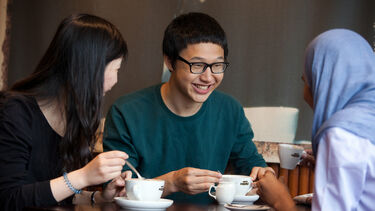Improving my language skills and career prospects in Paris

Why did you decide to study abroad?
I decided that I wanted to study abroad in order to give me some more time, as well as opportunities, for new experiences before I graduated from my degree. I lived abroad when I was younger and wanted to experience it again in order to decide where I wanted to look for jobs after my degree. I chose France as I was looking to improve my language skills (I had the opportunity to do so by taking half of my politics courses at Sciences Po in French). Once I had chosen France, I decided on Sciences Po Paris due to its reputation as one of the best universities in the world for Political Science, and in the hope that it would challenge me and my assumptions and preconceptions.
How was studying at Sciences Po Paris different to ļý¬ę”į“Ķ?
I study Politics and International Relations at ļý¬ę”į“Ķ, and the modules I chose at Sciences Po Paris were mostly within that field, but with a much stronger focus on French Politics and Political History. Sciences Po has an incredibly varied module choice for incoming exchange students across a variety of related disciplines, including Politics and International Relations, Economics, and History. I loved my module on the ‚ÄėPlaces of Power in French Politics‚Äô, but I also had great fun going outside of my usual field and studying a module called ‚ÄėMind the Map: Approaches to Cartography in the Social Sciences.‚Äô Studying in such an international environment means you have access to an incredible variety of perspectives and ideas, and you will question assumptions you didn‚Äôt even realise you were making.
Sciences Po‚Äôs teaching style is quite different to ļý¬ę”į“Ķ in that it is much less standardised. Each class and the assessments are really shaped to the professor‚Äôs desires, and can vary from presentations, to essays, to book reviews, to producing maps, I even had an interactive simulation of debate in the Israeli parliament. There is a much stronger focus in the exchange programme on small-group seminar classes, but there is less discussion and reading for these than at ļý¬ę”į“Ķ. The professor will lecture for half the seminar, then students will engage with the course through presentations and discussion of those presentations.
What was general student life like while you were there?
I was in France during the 2022 Presidential Elections, and there was a very excited atmosphere in Paris and at Sciences Po in the lead-up to the election. There were protests at my university and the building was closed for the day as French student activists that opposed the choice between Macron and Marine Le Pen blocked off the entrance to the University with bins and fences! At various times the roads were closed around me as motorcades of important officials in black vans rushed past, escorted by police motorcycles.
The social experience at Sciences Po and in Paris more generally is great ‚Äď it is a huge, vibrant city, and there is always something going on. Sciences Po is a really compact campus right in the centre of Paris, and the exchange programme is full of students in the same situation as you; alone in a new city and looking to make friends to experience it with. If you‚Äôre willing to put yourself out there at the start of the semester, you‚Äôll have no problem making friends.
How has studying abroad helped your personal or professional development?
During my year abroad, I made the decision that I want to work abroad in Europe when I graduate. I have improved my French skills to C1 level and picked up some German. The language skills and international experience I gained are vital to working in international institutions that I would love to work in, like UNESCO or the EU institutions. My year abroad has made me a more well-rounded individual, and I have become more employable because it gave me extra time to understand my skillset and I have become more capable of expressing what makes me stand out. The reality of my year abroad was better than I could ever have hoped for, and I would recommend studying abroad to anyone who would listen. I feel much more academically mature and prepared for my final year and a lot surer of what I would like to do after I graduate. The experience was absolutely incredible ‚Äď it was academically enriching, culturally fascinating, and so much fun.
William's Top Tips for studying abroad
- Look for accommodation early, especially in big cities like Paris. You will find some, but you don’t want to be staying in a hotel for 2 weeks when you’ve already started class! Many countries don’t have student accommodation in the same way UK universities do, or it may be reserved for local students.
- Try to get in contact with the people from previous years who studied abroad in the place you’re studying. They’ll often have some great tips!
- Spend as much time as possible outside of your accommodation. See the place you’re living! Try as many new things as possible that come your way while staying safe. There’s something special about really getting to know a new place.

International undergraduate scholarships
We offer a generous package of financial support for international undergraduate students, including scholarships worth £10,000 towards the annual tuition fee (worth up to £40,000 for four-year programmes).
Applications are open for existing offer holders for an undergraduate degree programme starting in autumn 2025.


